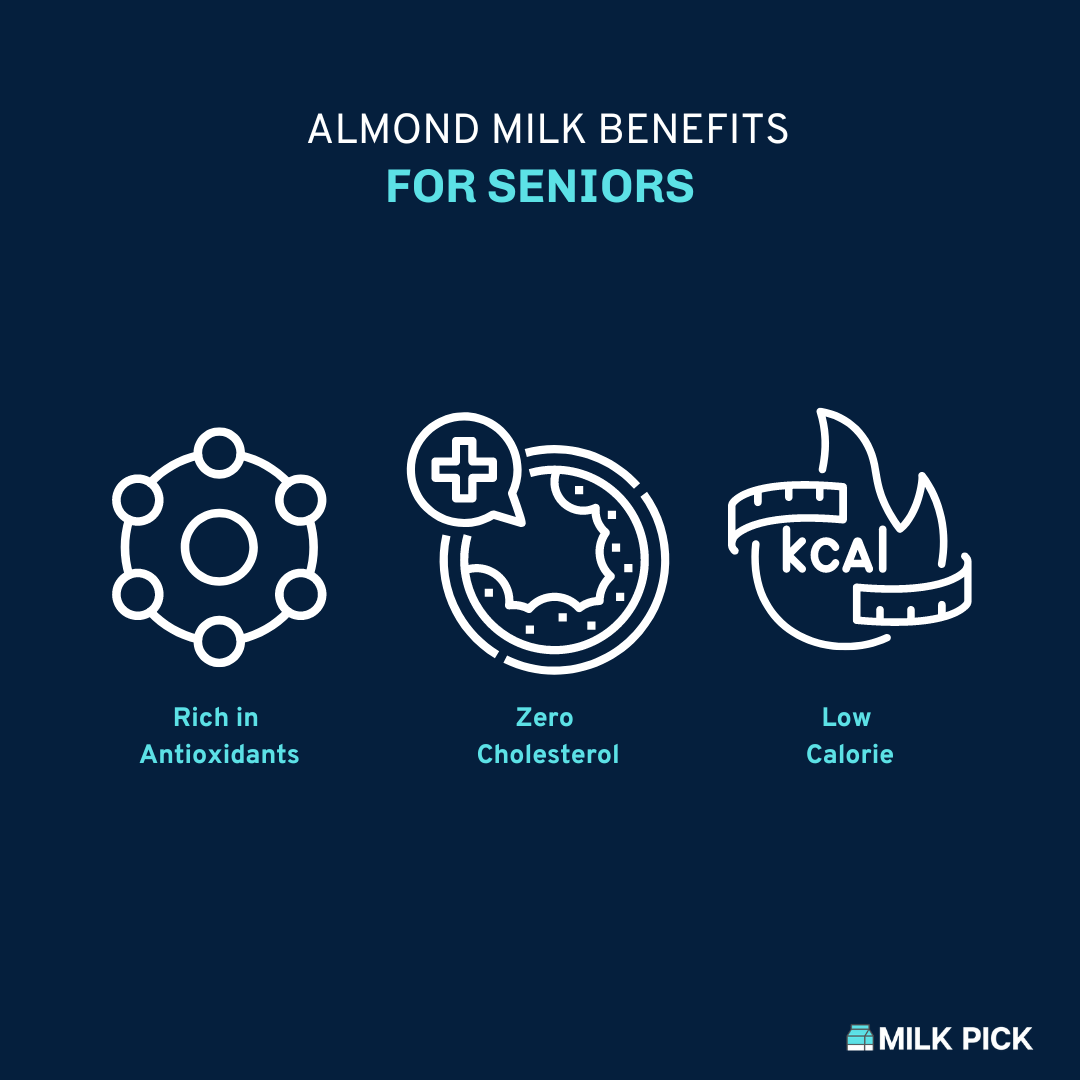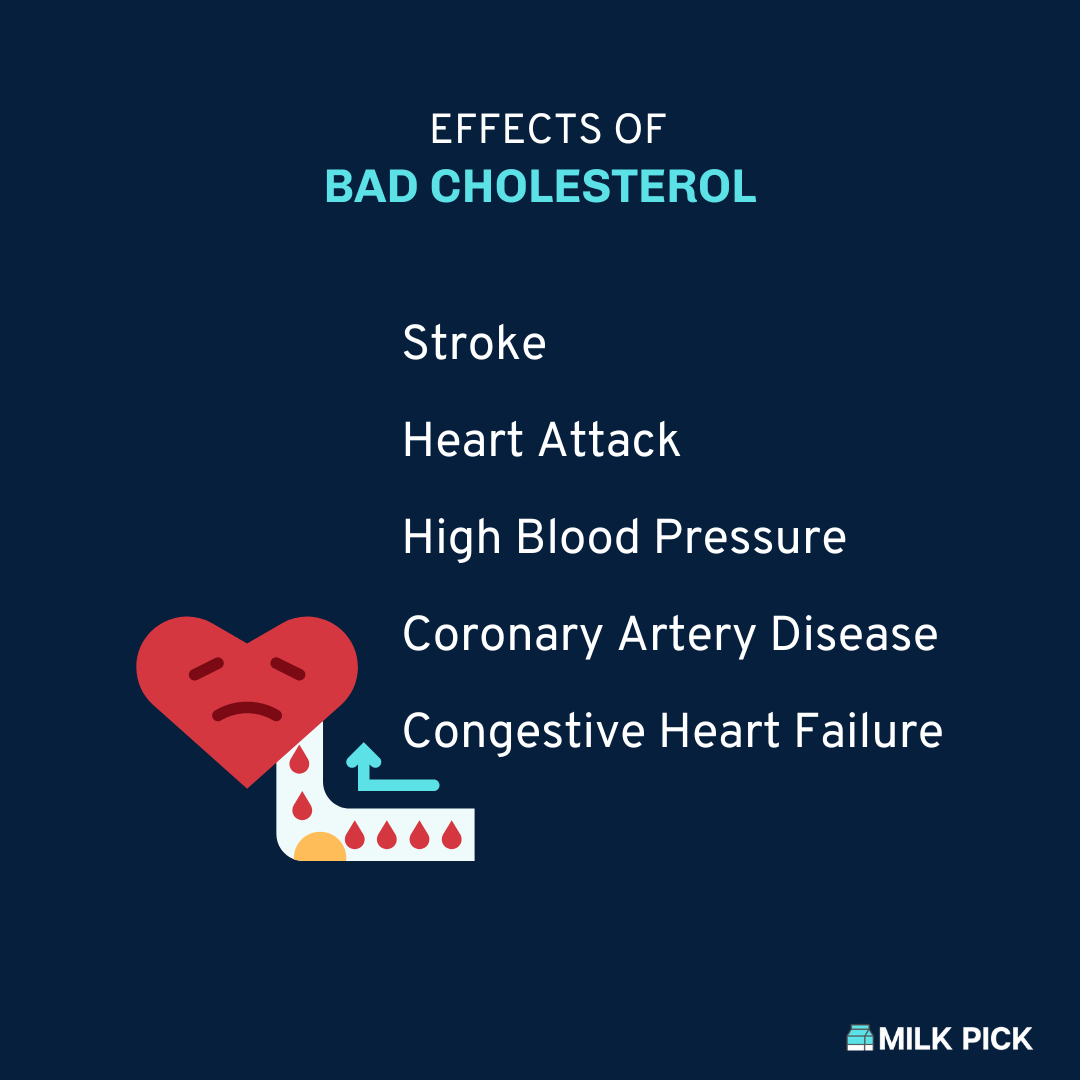Nutrition plays a massive role in your health and quality of life as you age. With milk being an everyday staple in most diets, you may wonder if almond milk is good for seniors.
Almond milk is a good choice for seniors because it’s rich in the antioxidant vitamin E, which helps fight off the damaging effects of aging. Almond milk is also low in cholesterol and calories, which will optimize your cardiovascular health and promote healthy weight management as you age.
This article will review the nitty-gritty details of how almond milk impacts your health as a senior.
It will also teach you how to choose almond milk that meets your health needs throughout your lifespan.
How Does Almond Milk Help Seniors
One of the main reasons almond milk is helpful for seniors is its antioxidant effects.
Antioxidants minimize the impact of free radicals in your body that are more likely to cause dysfunction as you age.
Almond milk is particularly rich in vitamin E, which research has found is a powerful antioxidant involved in preventing and reversing many common diseases as we age.
In addition to combating diseases, almond milk is also low in cholesterol which reduces your risk for cardiovascular complications like stroke or heart disease that tend to occur in the elderly.
And if those two reasons don’t convince you that almond milk is a good choice for seniors, let me tell you yet another benefit of almond milk for the elderly.
Almond milk is also a lower-calorie option, making maintaining a healthy weight easier as your metabolism slows down.
All of these nutrients in almond milk come together to help you maintain your health and prevent the onset of new diseases as you age.

The Impact of Antioxidants on Seniors
We now know almond milk is rich in vitamin E, a well-established antioxidant. But why should you be concerned with consuming antioxidants to begin with?
As we mentioned previously, antioxidants reduce the impact of harmful free radicals in your body that seek to break down tissues.
The aging process naturally occurs due to tissues breaking down and becoming less efficient, so you don’t need excessive free radicals speeding up that process.
And when free radicals are present in high enough amounts, you are also at a greater risk for an array of diseases.
It only makes sense that to slow down the impact of aging on your body, you want to prioritize consuming foods and beverages rich in antioxidants.
Here's a quick video with more details on how antioxidants fight free radical damage.
Vitamin E and Seniors
While many antioxidants are in our diets, vitamin E is particularly worth noting for seniors.
Vitamin E has been found to delay the aging process in all the cells in your body, which enhances your longevity.
It also has been shown to optimize your cognitive function by preventing the deterioration of your brain cells.
Research has even found that consuming adequate amounts of vitamin E may reduce your risk of developing Alzheimer’s disease.
Almond milk is rich in vitamin E and has about 50% of your daily value in just one glass.
Given that brain health and cognition tend to be a problem as we age, consuming a glass or two of almond milk daily may be an effective way to maintain your overall cognitive health.
Importance of Cholesterol for Seniors
Another important factor to consider as you age is your cholesterol. High levels of unhealthy cholesterol, generally found in saturated fats, can cause your arteries to clog up with plaque.
This accumulation of plaque in your vessels can lead to an array of cardiovascular complications like:
- Stroke
- Congestive Heart Failure
- Coronary Artery Disease
- Heart Attacks
- High Blood Pressure
Each of these conditions can negatively impact your quality of life and be potentially life threatening.
One of the best ways to manage your overall cholesterol to keep your heart happy is by making sure you’re not consuming too much unhealthy cholesterol.

Almond Milk and Cholesterol
Almond milk is an excellent choice for seniors looking to manage their overall cholesterol levels because it is free of saturated fats that tend to wreak havoc with your cholesterol levels.
On the other hand, traditional whole-fat cow milk has, on average, 35 milligrams of cholesterol per eight-ounce glass.
The cholesterol can add up quickly if you’re consuming traditional cow milk in high quantities or baking with it.
Using almond milk will help you keep your blood vessels clear and flowing smoothly as you age to avoid issues with your heart function.
Metabolism and Seniors
In addition to high cholesterol becoming a more significant concern as you age, managing your body weight can also become more challenging.
Research attributes this to our metabolism slowing down as we age and a general reduction in physical activity and skeletal muscle.
Simply put, we don’t move as much or as well as we used to as we age.
Age | Metabolism |
|---|---|
Up to 1 Year Old | Very high metabolism |
1-20 Years Old | Higher metabolism than adults, but lower than babies |
20-60 Years Old | Stays relatively constant in men and women |
After 60 Years Old | Slowly declines at 1% a year |
Researchers also found in a study of aging mice that healthy amounts of caloric restriction is associated with longevity.
Based on this information, it would appear that focusing on not consuming excessive amounts of calories each day could help you to live a longer and healthier life.
Caloric Density of Almond Milk
The traditional American diet lends itself to easily consuming high amounts of calories each day. As we just discussed, this is not advantageous as we age.
Luckily, almond milk is a calorie-smart beverage, especially compared to traditional milk.
An eight-ounce glass of unsweetened almond milk contains approximately 40 calories. The same eight-ounce glass of 2% fat cow milk contains about 120 calories.
Making the switch to almond milk is a simple way for you to cut out some extra calories to keep a healthy weight.
It’s important to note that not all almond milk is low in calories.
Flavored and sweetened variations of almond milk can contain up to 100 calories per eight-ounce glass, making it more calorically dense.
Traditional Cow Milk vs. Almond Milk for Seniors
Now that we know almond milk is a better choice for seniors when it comes to many aspects of your health, you still might be wondering how almond milk compares to traditional cow milk for seniors.
One area where cow milk may surpass almond milk for the aging population is protein content.
As a senior, consuming enough protein to maintain muscle mass and strength as you age is essential.
Traditional cow milk has about 8 grams of protein per eight-ounce glass. An eight-ounce glass of almond milk only has 1 gram of protein.
However, the protein benefits of cow milk don’t necessarily outweigh the risks.
We know that cow milk will lead to higher cholesterol levels, but research also shows it may increase your risk of developing certain cancers.
Knowing that you can get protein from other sources, almond milk may be the better choice for seniors as the health benefits outweigh the risks compared to traditional cow milk.
What Type of Almond Milk Should Seniors Buy?
With so many options available on the market, it can become overwhelming to know which one you should choose as a senior looking to improve your health.
While almost any almond milk variation will most likely be more beneficial than traditional cow milk, there are a few things you may want to consider.
First, you may want to opt for an unsweetened variation if you have diabetes. Unsweetened almond milk is better for your blood sugar levels and reduces your overall caloric consumption per glass.
Another important consideration is looking for almond milk fortified with vitamin B12. Many older adults are deficient in vitamin B12, which may impact your neurological function.
Opting for unsweetened almond milk fortified with vitamin B12 will help assure that you’re not spiking your blood sugar and ensure your nerves function at their best.
Final Thoughts
Almond milk is an excellent dietary choice for seniors due to its many health benefits. The vitamin E in almond milk will provide antioxidant effects that minimize the impact of aging and protect your brain.
In addition to the benefits of vitamin E in almond milk, low cholesterol levels and lower caloric density will promote good cardiovascular health and encourage healthy weight management.
And while cow milk may be higher in protein than almond milk, the risks of consistently consuming traditional dairy for your health do not outweigh the cons as an older adult.
When picking out almond milk at the grocery store, your best bet is to choose an unsweetened variation fortified with vitamin B12 to promote healthy aging.
At the end of the day, all the data seems to point to almond milk being the magic elixir you need if you want to live a long life free of disease.
